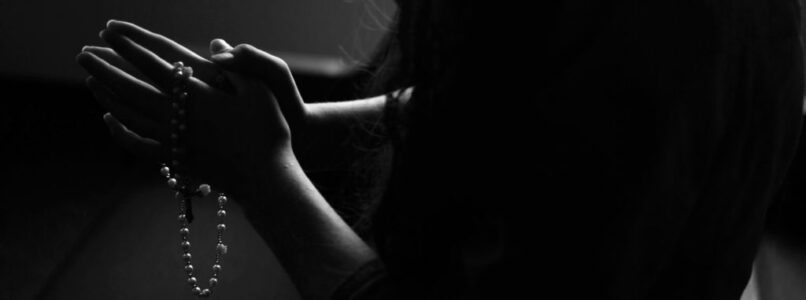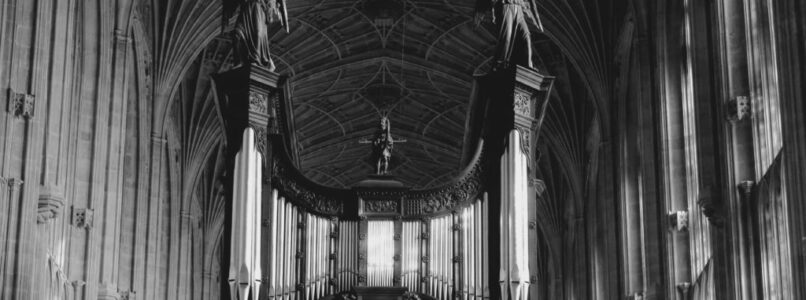The following is a selection from David’s book Protecting Your Purity: Help from St. Thomas Aquinas and the Angelic Warfare Confraternity (New Hope Publications, 2009) and is used by permission. You can purchase the book here.
In the Arctic tundra of North America and Europe lives a short-tailed weasel with snow-white
fur called the ermine. Supposedly, it takes great pride in its pure coat, and hunters take advantage of this. Rather than setting traps, the hunters find the ermine’s home and put garbage around the entrance to it. Then they send out the dogs. In an attempt to escape, the ermine dashes for the safety of his home. However, when he finds the entrance covered in filth, he refuses to enter because doing so would soil his pure white fur. Instead, the ermine turns around to face his certain doom.
You could say that the ermine has the attitude: “Give me purity or give me death!” However, most of us share the attitude of St. Augustine, who before his conversion would pray, “Give me purity…but not yet!” We say we want to be pure, but we often don’t want to make the necessary lifestyle changes to protect our purity. Perhaps this is because we have grown quite attached to our lifestyle — we like it; it’s comfortable; it’s familiar — and we’re just plain terrified of change. Perhaps it’s because we think a life of purity is simply impossible, having been discouraged by so many failed attempts in the past. Whatever the case, we tend to give up very quickly on the idea. Yet, by giving up we expose the truth that we never really made purity a priority. If we really desire to live a sexually pure life, then we will have a firm resolve to do whatever it takes and seek whatever help is available to foster and sustain such a life.
The Angelic Warfare Confraternity provides just the kind of help we need to protect our purity! The graces that flow from membership in this official association of the Dominican Order are truly out of this world! This is due to the prayers and protection of St. Thomas Aquinas, the “Angelic Doctor,” and the constant help of Mary, the “Queen of Virgins,” associated with the confraternity…
Before we delve into how St. Thomas Aquinas and the Angelic Warfare Confraternity can help us to protect our purity, however, we need to put first things first. What exactly is a sexually pure life? It’s a life of chastity…. Chastity, simply put, means living according to God’s plan for love and sex. So chastity should be seen as a virtue for everyone — whether a single person, a priest or religious, or a married person… Every Christian is called by virtue of his or her baptism to live God’s plan for love and sex!
This is where St. Thomas comes in. Thomas came from a very wealthy and politically-connected family, but to be honest he really didn’t want to have anything to do with the lifestyle that came along with that… One day when Thomas was in his mid-teens he did something unthinkable (at least to his family): He joined a new religious order of poor beggars called the Order of Preachers (the Dominicans). Let’s just say his family was less than thrilled. They didn’t mind so much Thomas becoming a priest; they just preferred that he would be a prestigious churchman with a lot of power and political clout. For this reason, Thomas’ family constantly tried to persuade him to abandon the idea of being a Dominican. Yet, Thomas’ resolve only grew and grew — he was convinced that this was God’s will for him. In an attempt to get Thomas away from his family, the Dominicans arranged to have him leave the country for his formation. However, on the way his own brothers (at the prompting of their mother) kidnapped him and dragged him away, throwing him into the prison tower of his family’s castle. Thomas was still a teenager at the time. During Thomas’ time in captivity his family bombarded him with threats and bribes to get him to give up on the idea of being a Dominican, yet every attempt failed miserably. Then Thomas’ brothers contrived a sinister plot. They would destroy Thomas’ purity, for surely if he committed a mortal sin and broke his vow of chastity, then he would feel himself unworthy and leave the Dominicans. So, Thomas’ brothers went into town and hired a prostitute to come to the tower to seduce Thomas. The woman, dressed provocatively, entered the cell and began to approach him. When Thomas caught sight of her, he immediately knew her intentions. Then St. Thomas did something that stunned everyone: This humble, gentle, mild, quiet “ox” of a man grabbed a torch from the fire in his cell and began to chase the prostitute away, all the while shouting at the top of his lungs like a wild man! The woman, terrified, ran to the door of the cell and banged on it frantically, crying to be released. The brothers, shocked by the commotion, ran to the cell and let the woman out. Then Thomas, shaken by this temptation and attack on his purity, fell to his knees before a crucifix and begged God to give him the strength to remain chaste. At that very moment, two angels appeared to Thomas and girded his waist with a cord, saying, “On God’s behalf, we clothe you with the cord of chastity, a cord which no attack will ever destroy.” St. Thomas himself testified that after this experience he was never again tempted to sin against the virtue of chastity! He also believed that his ability to understand and penetrate the truths of the Faith was a direct consequence of his purity, for Christ Himself had said, “Blessed are the pure in heart, for they shall see God” (Matthew 5:8)…
The Angelic Warfare Confraternity is an official association of the Dominican Order, dedicated to the preservation of chastity and the pursuit of truth under the patronage of St. Thomas Aquinas. It finds its inspiration in St. Thomas’ victory in his battle against sexual temptation as a teenager in the prison tower, and his being girded by the angels with the cord of chastity. Though no one is quite sure when the custom of wearing a cord in honor of St. Thomas and invoking his intercession to practice chastity began, it was a popular devotion even before any official local confraternities were founded in the 15th and 16th centuries. Pope Benedict XII made the Angelic Warfare Confraternity an official apostolic fraternity in 1727. Eight popes have recommended it, and popular saints and blesseds, such as St. Aloysius Gonzaga, Blessed Pier Giorgio Frassati, Blessed Columba Rieti and Blessed Stephana Quinzan (who actively promoted the devotion among women), were among its members. The devotion has begun to spark interest again, especially among young people, in part because St. Thomas was a teenager himself when he resisted the attack on his chastity, and in part due to the unique challenges of our modern culture which is so steeped in sexual immorality and is generally contemptuous of God’s eternal law and the virtue of chastity. Indeed, as Satan sought to destroy Thomas’ purity through the plot of his brothers, so even today Satan wishes to destroy our purity through the plots of those who spread lies and deceptions about God’s plan for love and sex — whether it be through the media, through the entertainment industry, through the schools and universities, or through the bad example of others. When I take a look at our world, it seems to me that we need the Angelic Warfare Confraternity more than ever!
To learn more about the Angelic Warfare Confraternity and how to become a member, click here. Also, listen to next Reason for Hope podcast being released on May 24: Angels, Demons, and Spiritual Warfare, featuring Fr. James Dominic Brent, O.P., Promoter of the Angelic Warfare Confraternity for the Dominican Province of St. Joseph.
David C. Hajduk, Ph.D. has over thirty years of experience in religious education and pastoral ministry, including youth, family life, and pro-life ministries. He has been a high school Theology teacher since 1993 and an Adjunct Professor of Moral Theology since 2008. David did his doctoral work on the thought of St. John Paul II. In 2019, he became the Director of Theology for Array of Hope. David is responsible for reviewing and creating program content, writing blogs, giving talks, and co-producing Array of Hope’s Reason for Hope podcast. David is an acclaimed and versatile speaker, specializing in topics related to God’s plan for life and love. His book, God’s Plan for You: Life, Love, Marriage & Sex (Pauline Books & Media, 2006, 2018), a book for teens on St. John Paul II’s Theology of the Body, received the Catholic Press Association of the United States & Canada Book Award in 2007. David is also a member of the Angelic Warfare Confraternity, a supernatural fellowship of men and women dedicated to pursuing and promoting chastity under the powerful patronage of St. Thomas Aquinas and the Blessed Virgin Mary. David and his wife, Shannon, have 11 children and homeschool.









